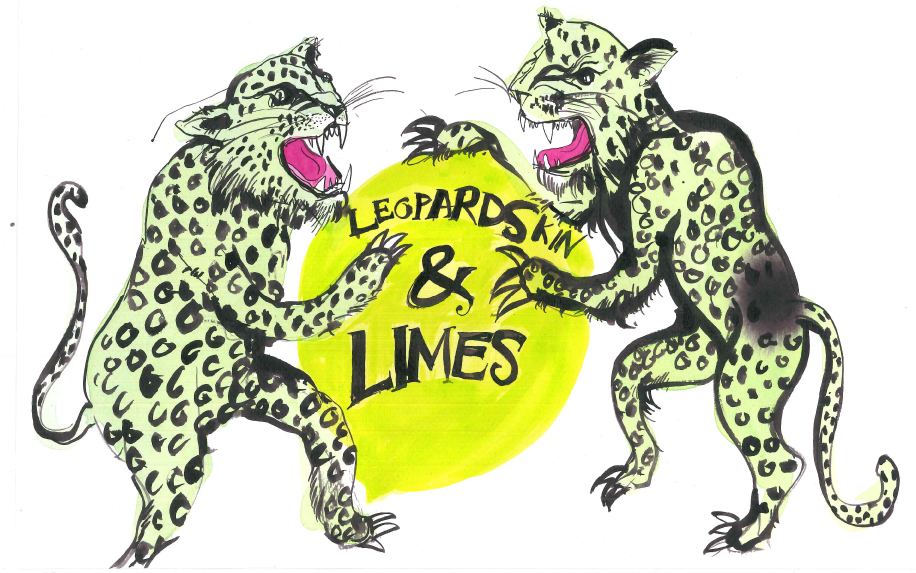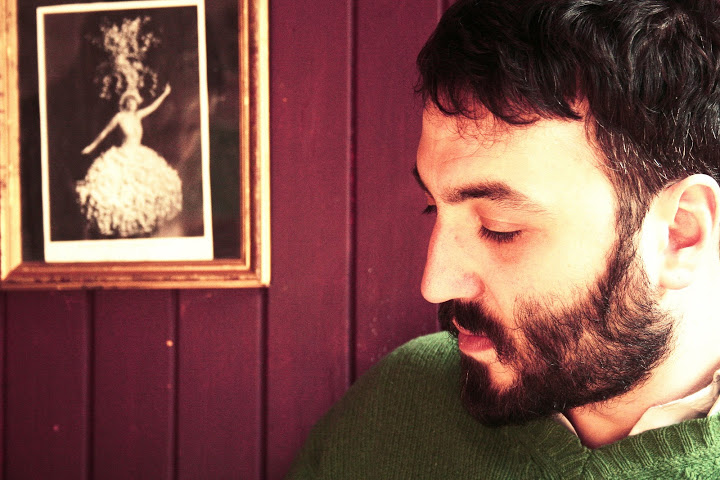Photo © Ericka Duffy
| by Jane Flett | November 20, 2015 |
Our featured writer this month is Ryan Van Winkle, an old friend and personal poetry hero of mine. Ryan spends most of his time touring the world reading poems to people, hosting events and podcasts, and putting on award-winning festival shows, but he took some time out of his schedule to talk to us about the moon…
I chose your poem, I Look Up Again, because it has, in part, this straightforwardness that I really love in your poetry but it also veers into a magical—almost mystical—territory. Can you tell us a bit about where the ideas in it came from?
Thanks, that’s nice of you to say.
So, there’s quite a convoluted history to this poem. Back in February 2010 I was commissioned by The Guardian Local (an ill-fated idea whereby the Guardian newspaper employed local bloggers to cover cities like Edinburgh) to write a ‘moon poem’. They got in touch because there was going to be a supermoon or a lunar eclipse or a blood moon or some kind of moon-y situation and the editor wanted to cover it on the blog with photographs from around Edinburgh and a new poem. I said I’d do it and, minutes later, hated myself for saying ‘yes’ because really, the world does not need another poem about the moon. Also, I’d never written to commission and I wasn’t sure how to begin the poem. Poems spring up, they’re not forced out.
So, what I remember most about making the poem was that a) I hated it & b) i complained about it to Anna Baccillarelli whose correspondence from the night I was drafting the poem was invaluable source material. Reading through our chat you’ll see how her lines sparked much of the good in the piece:
Ryan: i am writing about the moon. fucking boring.
Anna: does it have to be a romantic moon? passe, man… go for a michael jackson tribute.
Ryan: i am thinking sad lonely moon. nothing there. it was our greatest hope. or was it?
Anna: i would go for the
orbits and satellites
with a main of impact basins
and finish with freeze-dried ice-cream.
who am i kidding, i would write about valentina tereshkova if i was writing a moon poem.
Ryan: who? gosh, i guess i should look that up.
Anna: eclipse the habit of a lifetime? wow.
Ryan: this is all too stressful. I could never be poet laureate. i am nervous.
i WILL look that person up and eclipse myself. this poem is writing itself. keep saying things. it is helping.
(NB: I never have looked up Valentina Tereshkova)
Anna: nervous? why.
dust off your boots and walk in the craters of your skull:
there’s bound to be a face worth sticking a flag in.
cheesy (HA!).
And maybe because of that origin I really thought hard about including it in The Good Dark. It has never felt entirely like my own poem. But, whenever I’d read it back I’d re-discover this narrator who I was loyal to. A narrator always looking down, who was going to change, who was bummed that the myths of the moon were just myths but, nonetheless, was going to change his bad habits, was going to look up. I felt that suited the overarching ambition of ‘The Good Dark’ and it spoke to my own frustrations when it comes to needing to move, to change perspective.
What does your poem writing process look like? (Or, if it’s always different, can you talk us through writing a poem you particularly enjoyed?)
Well, I guess I just explained a bit of what writing a poem can be like. Though that was an exceptional experience. More typically, writing a poem takes a little quiet time and a short burst of an idea, phrase or image.
Sometimes it is a line from a song or magazine article or novel which sparks things off and then I’m just following the poem, seeing where it wants to go. And once I get moving I try to let the poem take control which means that I don’t dictate what I’m writing about. Often the poem I’m writing will have some of what I’ve been reading in it (in terms of tone or style) and some of what I’ve been experiencing or thinking about in life, but I don’t try to force it and I don’t often say — ‘I am going to write a hospital poem now’ or anything like that.
I know you do a lot of collaborations with other writers and musicians (check out some of Ryan’s projects here: http://ryanvanwinkle.com/projects/). How do you find working in collaboration compares to writing on your own?
Well, even when collaborating on something, I’m often still writing on my own. It isn’t like I’m making a sitcom so there’s no wacky writer’s room where myself and collaborators get together to bash out ideas.
But, you know, working with other people either in text or for performance is always interesting and it has changed my own relationship to my work. Part of what I learned, say, from working on Commiserate and other poetic collaborations with SJ Fower has been that writing remains a fun activity for me and it certainly is one in which the stakes are very low.
What collaboration has helped me re-discover is that the first step in in making work is making work. So, when you’re passing a poem back and forth you’re not waiting for the hand of god to come down and touch you, you’re rolling your sleeves up and cranking out some words. And that’s a really important practice. I spent a few years not writing very much because it is very easy to convince yourself you’ve got a crap idea. All my ideas start out crap, it turns out, but the trick is getting them on the page and then refining and refining them.
In terms of playing with music and musicians and mixing in theatrical stuff like we did in ViewMaster & Red, Like Our Room Used to Feel — well, that’s largely about expanding the amount of people who feel able to access poems. I think people are very wary of engaging with poetry so I’m interested in finding ways for audiences to enter a poetic space without that fear factor. Calling poetry ‘theatre’ or treating poetry like a gig can be very useful. And, of course, working with my pals is fun too.
I’m so glad you mentioned that writing is a fun activity for you. I feel the same way, and get rather bored of writers talking about the whole process as a torturous struggle. So if it ever stopped being fun, what would you do instead?
Well, ‘fun’ seems like too strong a word now. It is fun – but more like how learning to play an instrument is fun. It is torturous and annoying and tedious but it is enjoyable because finishing something is enjoyable, getting better at something is enjoyable. I worry ‘fun’ sounds like the work is all word-play and bouncy rhymes. My work isn’t like that.
And, of course, there’s plenty of times when writing hasn’t been fun or enjoyable. Or, perhaps more precisely, there have been times that I have forgotten that I enjoy writing. In those times, I still make work and write as much as I can but it is usually quite slow. So, I’m lucky enough that life affords me the opportunities to do other things. And normally, doing interviews with other poets like I’ve done on my Scottish Poetry Library podcasts or doing workshops with shouting 8 year olds like I get to do regularly rejuvenates my spirits and reminds me that I get satisfaction from making.
What are you working on right now?
I’ve been thinking about short poems lately and have made a rough draft of poems all under 12 lines long. So, that will hopefully be a book or chapbook one day soon. And I’ve been thinking a lot about doing another show soon — I’ve kind of got the skeleton of an idea that I want to work with and I’m just keen to see who I can collaborate with. I’ve been doing small one-to-one pieces because I like the intimacy of those shows and think it is a special way to hear poetry but I also want to do something bigger, maybe louder, without losing that feeling of direct contact with the audience. Right now, I’m looking for solutions.
And finally, who are some contemporary poets we should check out?
I’m evangelical when it comes to the work of Michael Burkard and Mary Ruefle from the United States and feel lucky that I’ve found their work. And, from the UK, I love and find inspiration in Vicki Feaver, John Glenday and Mario Petrucci whose ‘Heavy Water: poems for Chernobyl’ remains one of my top 5 poetry books.
Thanks so much Ryan

